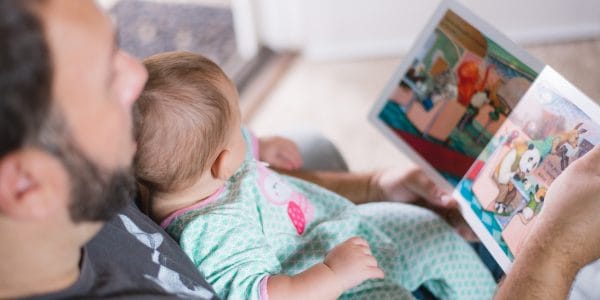
26/10/21
4 min read
The Chancellor will set out the government’s three-year public spending plans this week, alongside the Autumn Budget, which is expected to include a £500 million package to support families and early years. In this blog, Megan Jarvie sets out three urgent issues that the Spending Review needs to address in light of the impact of COVID-19 on early childhood education and care.
There has been much debate over recent weeks about what levelling up will actually mean, but it seems indisputable that narrowing the achievement gap for children must be a central aim of the agenda. Early education and childcare holds huge potential to level the playing field and enable all children to start school on an equal footing, by closing the education gap that opens up between disadvantaged children and their peers even before they start school.
The Nuffield Foundation’s new evidence review, The role of early childhood education and care in shaping life chances, rightly highlights the need for a full system review to address some of the inconsistencies that prevent early education and care policy from achieving its potential. A well-functioning system can improve outcomes for all young children, help to narrow the achievement gap and support parents to work.
But the current system lacks the coherence to allow all of these aims to be achieved. It consists of a number of well-intentioned but inconsistent policies layered on top of each other, which have created contradictions. The disruption to the early education and childcare sector caused by COVID-19 threatens to push the system in the wrong direction, further away from meeting the needs of disadvantaged children.
The Spending Review is an opportunity for change
While a full review is needed, there are also actions that can—and must—be taken more quickly. This week’s Spending Review provides an opportunity to tackle some of these issues head on. Action is urgent, as the pandemic has hit the sector hard and unevenly, and children who could benefit the most from high quality early education are most likely to miss out.
We have provided evidence to the Treasury ahead of the Spending Review on three key issues that need to be addressed, drawn from our COVID and childcare research project, funded by the Nuffield Foundation. The project is a collaboration between researchers from the Centre for Evidence Implementation, the University of East London, University College London, Frontier Economics, Coram Family and Childcare, and the Institute for Fiscal Studies.
1. Increasing uptake to narrow the disadvantage gap
The government funds some early education and childcare for all three- and four-year-olds as well as for disadvantaged two-year-olds. This helps children get ready for school and the impact can last right through their education and beyond, with stronger benefits for disadvantaged children. It is for this reason that funded early education and childcare is targeted particularly at disadvantaged children from the age of two, as it holds the ability to narrow the achievement gap. But since the pandemic, uptake of early education for disadvantaged two-year-olds has fallen dramatically, with a 13% reduction in the number of two-year-olds accessing their funded places between January 2020 and January 2021.
Even amongst three- and four-year-olds, there is evidence that take up has fallen more amongst disadvantaged children than their better-off peers. Between January 2020 and January 2021 the proportion of school children eligible for the pupil premium rose by 20%, but over the same period the number of three- and four-year-olds eligible for pupil premium who access free early education increased by only 6%. If disadvantaged children are not attending early education then the policy will fail to help boost their outcomes. It is vitally important that families fully understand the benefits of early education and are supported to navigate the application process so that they can make the decision that is right for their child.
2. Increasing funding rates to cover the cost of care
It is also vital that if parents decide to send their child to a nursery that there are places available, which is something that cannot be taken for granted due to the funding struggles facing the sector. Early education and childcare is provided by a mixture of private and not-for-profit nurseries, childminders and schools. The majority of these childcare providers receive some income directly from the government for supplying early education and childcare places. Some also receive income from parent fees, normally for children under three, or for additional hours needed by working parents for three- and four-year-olds.
But government funding rates do not cover the costs of providing early education and instead rely on cross subsidisation from parent fees or other income. Since the outbreak of the pandemic, parents have simply been buying less childcare, putting this whole business model at risk. Early in the pandemic, 20% of parents who had previously used formal childcare said they had no intention of using it again, suggesting that at least some reduction will last into the medium term. While there have been calls to increase this funding rate for some time, the urgency of these calls is rapidly increasing. Without funding that truly covers the cost of care, childcare providers may not be able to offer all the funded places that are needed and more providers may close.
3. Recruiting and retaining qualified staff
Another key challenge the sector faces, which could also lead to a decline in early education and childcare places, is the growing difficulty in recruiting and retaining qualified staff. The funding squeeze means that pay in the sector is low – just £7.42 per hour on average. The pandemic saw experienced professionals moving to other sectors, such as retail, where pay was comparable or better but where they felt less exposed to the risk of COVID infection. Our research found some childcare providers having to cut back the number of places they offered as they simply could not find the appropriately qualified staff.
Hope for the future
There is no doubt that the early education and childcare sector faces significant challenges, but there is still reason for optimism. Effective policy in this area really does hold the ability to change lives. It can prevent children from falling behind, reducing the pressure on schools to fix a problem that has already started to become entrenched. It can support parents to move into work, supporting social mobility through multiple generations. I hope that we can use the opportunity emerging from the current crisis as an impetus to make the long-needed changes to the early education and childcare system that could finally make a substantial impact on the achievement gap.
About the author
Megan has been Head of Coram Family and Childcare since November 2018 and has worked for Coram Family and Childcare since 2016, previously working as Head of Policy and Communications. Megan is a leading voice for families, parents and childcare, and makes a demonstrable difference to policy on families and childcare in the UK. Before joining the organisation, she worked in campaigns at Child Poverty Action Group and Diabetes UK and in policy and strategy for local government and the NHS. Her work for local government and the NHS involved service improvement and change management, as well as working in family services.



















































